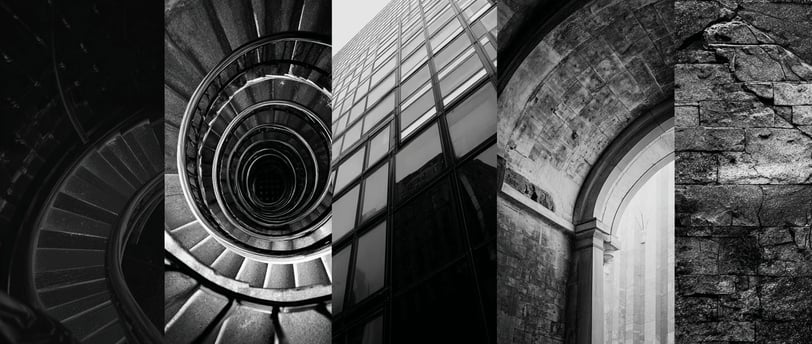Discover Art for Every Space — From Collector Prints to Curated Digital Downloads
What to Photograph in Black and White: Creative Ideas from Architectural Photographers
BLACK AND WHITE PHOTOGRAPHY INSIGHTS
Gary Washington
6/18/20253 min read


Why Some Subjects Just Look Better in Monochrome
Black and white photography isn't just about aesthetics — it's about intention. Certain subjects shine when color is removed, revealing emotion, form, and texture that might otherwise go unnoticed.
Whether you're an aspiring artist or someone curating fine art for your space, knowing what to photograph in black and white makes all the difference.
7 Things That Work Beautifully in Black and White
These categories consistently result in powerful, emotional, and gallery-worthy black and white images — trusted by professionals and loved by collectors.
1. Architecture and Urban Design
This is where black and white architectural photographers thrive. Geometry, shadow, and repetition turn buildings into visual poems. With color removed, the structure becomes the subject.
Look for:
Brutalist or minimalist facades
Staircases, bridges, columns
Reflections in glass or metal
Lines and curves that create rhythm
This type of photography works especially well in large format prints for homes, offices, and creative studios.
2. Portraits and Human Emotion
Without color, facial expressions and body language come to the forefront. Black and white portraits emphasize mood, not fashion.
Best for:
Candid moments
Older subjects with expressive features
Low-key lighting setups
Moments of reflection, joy, or intimacy
It’s no wonder many photojournalists and fine art photographers still prefer black and white for this genre.
3. Street Photography and Everyday Life
Black and white street scenes simplify the chaos of daily life. By removing color distractions, the viewer sees movement, story, and setting.
Perfect for:
Candid scenes in city environments
Light and shadow interactions
Urban solitude or community energy
This genre is often where emotional storytelling thrives.
4. Nature and Weather
While nature is usually associated with vibrant colors, black and white photography captures the mood of nature, not just its beauty.
Try photographing:
Stormy skies or dramatic clouds
Trees in fog or snow
Desert landscapes with cracked textures
Water in motion (rivers, waterfalls, waves)
Look for texture, tone, and atmosphere over vibrant hues.
5. Textures and Patterns
If your subject has a strong tactile quality, it will likely translate beautifully into monochrome.
Examples include:
Rusted metal or peeling paint
Brick walls and stone surfaces
Fabric folds and hand-made materials
Shadows creating patterns on concrete
These shots can be abstract and timeless, making them ideal for creative wall art.
6. Still Life and Minimalism
Black and white helps minimalist subjects feel bolder. A single vase on a table. A chair by a window. A reflection in a puddle.
Use simple backgrounds and controlled light to create tension and calm in one frame.
7. Historical and Documentary Scenes
Black and white adds visual weight to historic or documentary-style images. It strips time and color, focusing attention on context and character.
Try capturing:
Abandoned buildings
Forgotten objects
Museums, relics, or local landmarks
Cultural or religious architecture
These subjects offer both emotional and archival value.
How Black and White Architectural Photographers Choose Their Subjects
Professional architectural photographers look for:
Clean geometry that photographs well from different angles
Strong contrast between light and shadow
Emotional resonance — does the structure evoke calm, strength, or solitude?
Their job isn’t just to document — it’s to translate design into feeling. Whether capturing a spiraling staircase or a concrete block wall, the best photographers think about story, not just style.
Tips for Choosing Your Own Subjects
Not sure where to start? Use these tips:
Shoot in color, then convert to black and white in editing — see which works better
Ask yourself: Would I still like this photo if it had no color?
Use high contrast light to enhance texture
Keep backgrounds clean and uncluttered
Start with things you know — your home, your street, your city
Sometimes the best black and white photo is right in front of you.
Final Thoughts: Seeing the World Differently
What makes black and white photography so powerful is not just the lack of color — it’s the focus it demands. When you choose what to photograph in black and white, you're choosing to highlight shape, emotion, light, and story.
Whether you're behind the camera or shopping for your next favorite print, knowing the power of subject choice deepens your appreciation for the medium.
Want to See These Ideas in Action?
Explore our curated gallery of black and white architectural photography — featuring real-world examples of subjects that speak without color.
Get expert tips in How to Photograph Architecture in Black and White.
Mr. Washington Gallery
Mr. Washington Gallery showcases striking black and white architectural photography and fine art prints. Rooted in timeless design and thoughtful composition, each piece invites reflection, storytelling, and a deeper connection to the built world.
Quick links
© 2025. All rights reserved.
